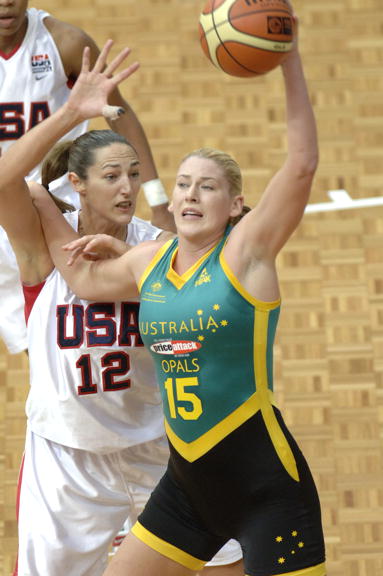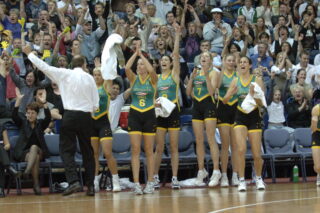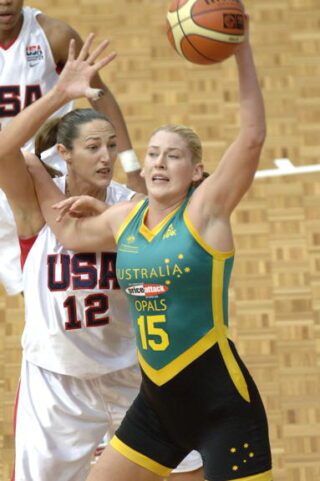- Entry type: Person
- Entry ID: AWE2380
Jackson, Lauren
(1981 – )
- Born 11 May 1981, Albury, New South Wales, Australia
- Occupation Basketball Player, Olympian
Summary
Lauren Jackson is widely regarded as Australia’s greatest female basketball player ever. She has led the nation’s team, the Opals, to three silver medals at successive Olympic Games in Sydney (2000), Athens (2004) and Beijing (2008) and a much cherished bronze in London in 2012. She was chosen to carry flag for the Australian Olympic team in London in 2012, which was, she says, ‘the proudest moment of my sporting career’.
Details
Lauren Jackson is widely regarded as Australia’s greatest female basketball player ever. She has led the nation’s team, the Opals, to three silver medals at successive Olympic Games in Sydney (2000), Athens (2004) and Beijing (2008) and a much cherished bronze in London in 2012. She was chosen to carry flag for the Australian Olympic team in London in 2012, which was, she says, ‘the proudest moment of my sporting career’.
Born in Albury, New South Wales, in 1981, Lauren Jackson says that at the age of four she had already hatched the plan that would take her to representing the Australia at the Olympics. While there is no doubt she had the genetic pedigree and family support to make the plan a reality (both her mother and father had represented Australia in basketball) it was her mental strength and determination combined with a deep love of the game that made the difference. By the time she was in Year 7 she knew she loved the game enough to want to leave home and attend the Australian Institute of Sport (AIS). In 1997 at the age of 16 Jackson was awarded a scholarship to in 1997. In 1998, she led the AIS side that won the Women’s National Basketball League (WNBL) championship. In 2000, she was playing for the national team, the Opals, at the Olympic Games in Sydney.
For the self-confessed homebody, the pathway early in her career was not always an easy one; she missed her home and family keenly. She also had a little bit of a chip on her shoulder about always being the youngest member in the team, that might have made her more aggressive at times than she needed to be. But the influence of her teammates helped her to settle in and to settle down. ‘The team back then was full of beautiful souls,’ she says. She was lucky to have ‘good hearted people like Rachel Sporn, and Sandy Bondello around her. Strong personalities like Michelle Timms and Robyn Maher were also very important to her development as well. Robin Maher, in particular was very strong willed and challenged her to be the best she could be. ‘My early days and the support I received from my teammates made my early years very, very special.’
Jackson joined the AIS in the same year that the U.S. Women’s National Basketball Association (WNBA) began competition (1997) so she knew that if she worked hard and the breaks fell her way, there was a professional pathway for her. She made herself available for the WNBA draft in 2001 and was an automatic first choice for Seattle Storm. She has been named as winner of the WNBA’s Most Valuable Player award for the Storm three times (2003, 2007 and 2010) and has helped them to victory in the national Championships in 2004 and 2010. She has also played in Spanish and Russian leagues throughout the course of her career, while remaining committed to the national team, always making herself available (when fit) for Olympic Games and World Championships. While never being able to claim the ultimate prize at the Olympic Games, in 2006 Jackson led the Opals to victory over Russia for the 2006 World Championship crown.
In 2012 Jackson become the youngest person ever to score 6000 points in the WNBA, needing 32 games fewer than any others who have achieved the milestone. She claims that although she is proud of the achievement, it’s probably more meaningful to people other than herself, after all she was younger than most when she started playing. Christina Keneally, the CEO of Basketball Australia, thinks Jackson is selling her achievements short. ‘She’s the greatest player in the American league and the fact that she wants to play in Australia speaks volumes about her commitment to her country. It’s a great show of leadership’.
Keneally was referring to Jackson’s decision to return to play for the Canberra Capitals in 2009 when discussing this commitment. Jackson returned to Australia to play out the 2009/10 season, a season that saw the Capitals win the National WNBL title and Jackson announced the Grand Final MVP. It was a very meaningful victory, one that she has not been able to replicate since, due to commitments overseas and frustrating injury problems. In an interview conducted in 2012, Jackson expressed her frustration: ‘Canberra has been my second home since she was 15. I want to be part of the community and help the team. I am looking forward to playing for a team I love in a city I love.’
Jackson admits that there have been sacrifices along the way, particularly in the area of her personal life. ‘True love and a family’ are hard to establish and sustain if you are a professional sportswoman playing a global sport. Thus far, she has chosen basketball over her personal life, but she has no regrets and believes there will still be time for her to pay attention to what she has missed out on, personally.
Although hardly preparing to throw in the towel yet, Jackson is preparing for life after sport. Whilst on the playing circuit, she began a gender studies degree and found that the content just clicked with her, as she began working through how feminism informs her own decisions and how she can make a difference in life after basketball. She discovered that she wants to assist women suffering from domestic and sexual violence and is now a patron of the New South Wales Rape Crisis Centre. She wants to play a part in empowering women who need to make the decision to leave violent and abusive relationships, and hopes that associating her name with the organisation is an early, first step in that process.
Lauren Jackson is arguably Australia’s greatest ever basketballer, although she would never accept the title without sharing the spoils with those who have supported her, especially her parents. ‘My mother gave up a lot for me,’ she says. ‘She was a real pioneer in the game as well.’ In her view, her central role in putting Australian basketball on the map globally would not have been visible without the talented players who have already surrounded her and nurtured her. To achieve any success, as an individual and as a leader, she says, ‘you have to have great people around you’.
Events
-
2000
Member of the Opals, the Australian Women’s Basketball Team
Silver Medalist at the Sydney Olympic Games -
2004
Member of the Opals, the Australian Women’s Basketball Team
Silver medalist at the Athens Olympic Games -
2008
Member of the Opals, the Australian Women’s Basketball Team
Silver Medalist at the Beijing Olympic Games -
2012
Member of the Opals, the Australian Women’s Basketball Team
Bronze Medalist at the London Olympic Games
Digital resources
Published resources
-
Site Exhibition
- She's Game: Women Making Australian Sporting History, Australian Women's Archives Project, 2007, http://www.womenaustralia.info/exhib/sg/sport-home.html
- From Lady Denman to Katy Gallagher: A Century of Women's Contributions to Canberra, Australian Women's Archives Project, 2013, http://www.womenaustralia.info/exhib/ldkg
-
Resource
- Trove: Jackson, Lauren (1981-), http://nla.gov.au/nla.party-718074
- Australia at the Games, Australian Olympic Committee, 2006, http://corporate.olympics.com.au/index.cfm?p=25
-
Resource Section
- Angela Pulvirenti interviews Australian Opal Lauren Jackson about her life in basketball and her experiences in and out of competition., Pulvirenti, Angela, 2013, http://www.abc.net.au/news/2013-01-08/inside-edge-lauren-jackson/4456976
- Lauren Jackson, Gordon, Harry, 2012, http://corporate.olympics.com.au/athlete/lauren-jackson

